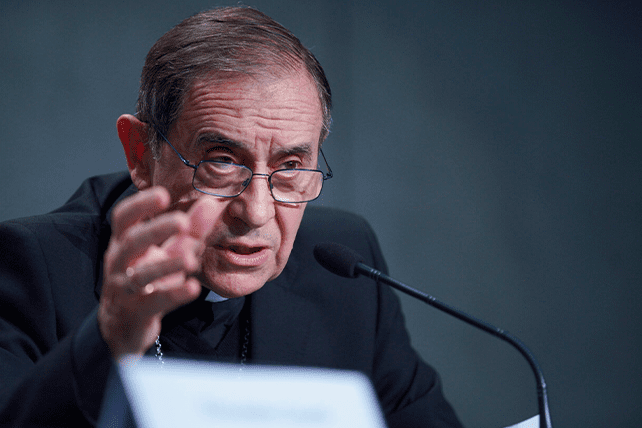VATICAN CITY (RNS) — As Pope Francis grapples with defiant bishops in Germany and the United States, a high-ranking Vatican official who oversees church law clarified on Tuesday (Nov. 28) the protocols for disciplining a bishop, saying any failure to act in communion with the church and the pope can be cause for dismissal.
“There is no official mechanism for the firing of bishops, which can be evaluated by the college of bishops and by the pope,” said Bishop Juan Ignacio Arrieta, secretary of the Vatican Department for Legislative Texts, at a meeting with the press organized by the Pontifical University of the Holy Cross.
Arrieta explained that a church trial is only necessary if the bishop is accused of a crime. “Sometimes it’s a question of a single act, others it’s an issue of conduct,” he said, while in other cases the bishop’s behavior may require “an evaluation of communion” with fellow bishops and the pope.
Popes rarely take the step of firing dissenting bishops, instead preferring to request a letter of resignation that is in turn accepted by the pontiff. But on Nov. 12, Francis dismissed Bishop Joseph Strickland of Tyler, Texas, a fierce critic of the pope and a leading voice of the conservative opposition to Francis in the United States. Strickland’s diocese had been placed under Vatican investigation earlier this year after he had made a habit of passing along criticism of the pope on social media.
Francis also recently ended American Cardinal Raymond Burke’s privileges at the Vatican, withdrawing his salary and right to a subsidized apartment. In a Nov. 20 meeting, according to The Associated Press, the pope called Burke a source of “disunity” in the church.
In Germany, the Vatican has reined in the movement known as the Synodal Path, which has seen bishops embrace progressive positions in the course of a two-year-long consultation with lay Catholics on the questions of LGBTQ inclusion, women’s ordination and lay control. After a committee was commissioned to implement the movement’s proposals, the Vatican ruled that such a body would undermine the role of the bishops’ conference.
In a letter last week to German critics of the Synodal Path, Francis added his “concern” that the German church risks breaking from communion with the rest of the church.
Arrieta made clear the pope didn’t oppose the creation of the Synodal Path’s committee but said the whole church needed to move together on doctrine. “The contrast takes place when the doctrinal symmetry is lacking,” Arrieta said. “When bishops in a specific location want to intrude in a field that concerns the unity of the church, it’s clear that it creates problems.”
Arrieta also emphasized that canon law already leaves ample space for lay involvement and participation.
“The Second Vatican Council did a great job on the episcopate,” he said, referring to the reforms set in motion by the world’s Catholic bishops in the 1960s. The council gave bishops wide powers in their jurisdictions, which led to “great decentralization in the church,” said Arrieta.

